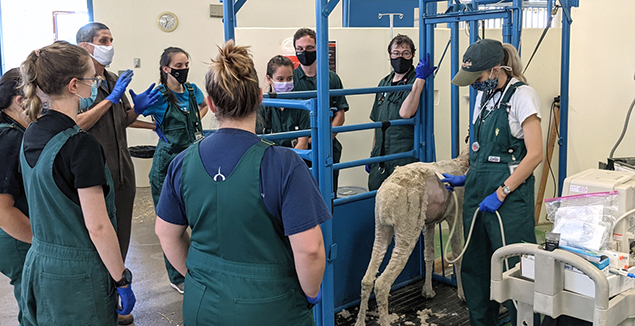OSU’s Carlson College of Veterinary Medicine: Veterinary Pulse
September 21, 2021
by Jens Odegaard
In the image above: Catherine Skinner examines an alpaca as Dr. Christopher Cebra teaches during the camelid course.
Catherine Skinner has gone two weeks without getting spit on. That’s hopefully a normal occurrence for most of us. But most of us aren’t working with alpacas and llamas on a daily basis.
Skinner just finished the Camelid Medicine and Surgery course, a two-week elective, at Oregon State University’s Carlson College of Veterinary Medicine. It covers all things alpaca and llama.
“I really thought [getting spit on] was going to be the biggest challenge for me,” Skinner chuckled. “And that was way low on my list. There were things that were way more challenging.”
Skinner is in her fourth year of veterinary school, and “I’m technically on the small animal track,” she said. With most of her coursework focused on cats and dogs, she decided to seize her chance at some large animal experience with the camelid elective.
“I felt like this was the safest place to learn about something I knew nothing about. I really like llamas and alpacas, but I’ve never owned any, and I’ve never worked with people who own any,” Skinner said. “So, I felt like the opportunity was there. I needed some elective credits, and I should fill it in with stuff that I’m probably not going to get at any other point.”
One of the things Skinner learned in the course is to read camelid behavior. It turns out that taking a direct spit hit usually only happens if you’ve really annoyed an animal and then stand right in the line of fire. A huge part of providing veterinary care is understanding the behavior of the animals you’re caring for and how to make their care experience as comfortable as possible for them.
Dr. Christopher Cebra, Glen Pfefferkorn and Morris Wendorf Endowed Professor in Camelid Medicine, and his faculty colleagues teaching the course, have the expertise and experience to impart this knowledge. “Dr. Cebra is really great to learn from,” Skinner said. “He is a wonderful teacher, very, very approachable … And he is like a wealth of information.”
Cebra has been running the camelid course for the last 15 years. Each year, an average of 18 people enroll. They’re not all CCVM students like Skinner. Students from other veterinary programs, both in the United States and abroad, as well as some practicing veterinarians take the course. “At Oregon State, we were very advanced in a lot of ways in our thinking as far as camelid medicine goes, and I just wanted to make sure that we organized it in such a way that we gave people useful information,” Cebra said.
During the course, those enrolled take a deep dive into the world of camelid healthcare. Course topics include herd health, medicine, castrations, reproduction, imaging, lab analysis, necropsy, parasites, surgery, limb fracture setting and medical procedures. In addition, students visit local farms where they put what they’ve learned into practice.
“We’ve done two field trips to different alpaca farms. We did a lot of pregnancy checks with ultrasound, trimmed nails and castrated a bunch of animals,” Skinner said. “I knew there was going to be hands-on experience, but I didn’t realize how much hands-on experience. So, I feel very satisfied by it. I feel very comfortable doing what I need to do if I was ever in a situation where somebody needed me to [provide veterinary care to] their alpacas.”
This level of comfort is exactly what Cebra hopes the course will provide. “It has the ability to turn somebody who maybe was involved in one or two cases during their senior year in the clinic, and maybe learned how to draw blood once or something, into somebody who actually is confident and might actively solicit calls,” Cebra said.
“And so that’s ultimately my goal, to spread our information as wide as we can, and to try to elevate camelid health care as far and in as many places as we can … I mean, camelids deserve it.”
We look forward to Camelid Owners Meet ‘n Greet
when we can safely gather together once more.
What topics are you, Camelid Owners, interested in?
Contact NWCF with suggestions for future classes.

